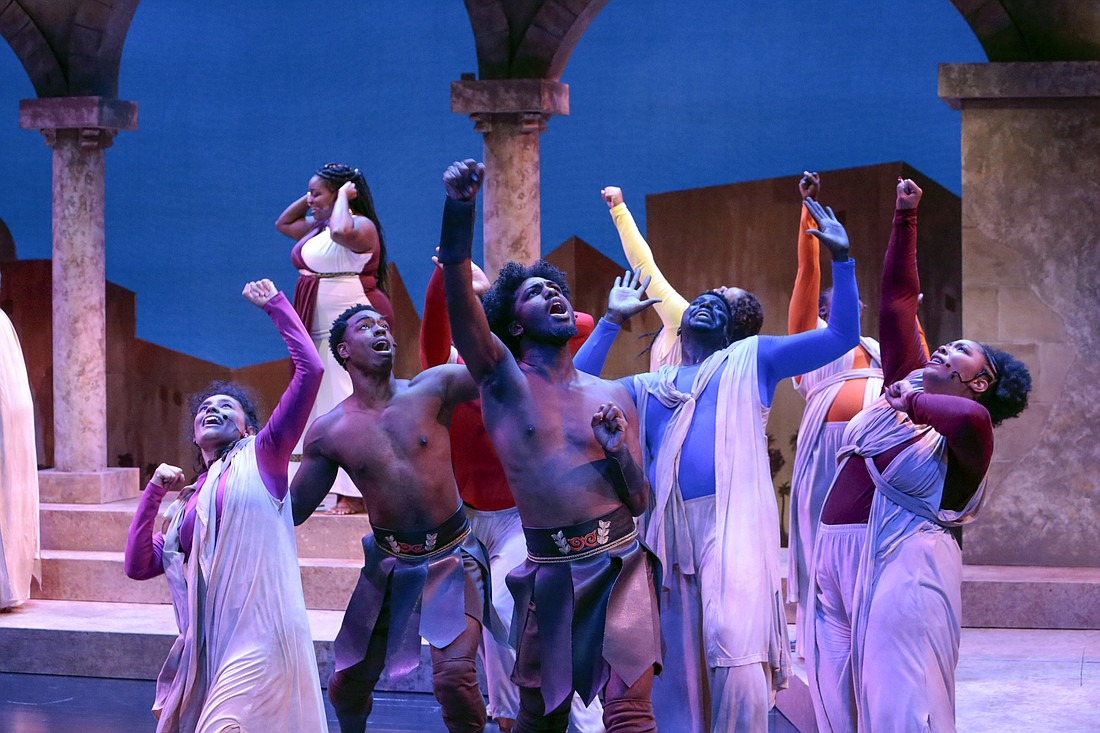- January 2, 2025
-
-
Loading

Loading

What would Jesus do? Before it became a bumper sticker, it was a timeless theological question. And, in a tradition dating back to medieval passion plays, it was also an actor’s question. In more recent times, musicals like “Jesus Christ Superstar” and “Godspell” put Jesus on the Broadway stage. In 1977, Vinnette Carroll did the same, with “Your Arms Too Short to Box with God,” a musical retelling of the Gospel of Matthew. Carroll wrote the script and directed the first production. Alex Bradford and Micki Grant penned the music and lyrics. All three creators were African-Americans. Their musical celebrated the legacy of African-American gospel music—and the people behind the music. In a Broadway first, Carroll’s gospel musical had an all-black cast. In a Sarasota first, West Coast Black Theatre Troupe has brought Carroll’s groundbreaking musical to its stage. What’s the story behind it? Director Harry Bryce was happy to share the good news.
What’s the heart of this musical’s story?
I’d call it an operetta, not a musical. But to answer your question, I’d say the story has two sides. The Gospel of Matthew is the story of the crucifixion — a gruesome account of Jesus’ betrayal and suffering that ends in the triumph of his resurrection. That’s a universal story for all people. But Carroll’s gospel celebration also speaks directly to the peoples of Africa, and the African diaspora worldwide. She portrayed Jesus and the Israelites as people of color. And they were. That’s historically accurate. During the time of the crucifixion, you couldn’t tell the difference between the Israelites, the Egyptians, the Sudanese or any other indigenous inhabitants of the African continent. That particular branch of the family of humanity didn’t end at the Red Sea.
In other words, Jesus doesn’t look like a blonde white surfer from California?
No! (laughs) I’d like to add that Carroll’s unique form of storytelling was also a stroke of genius. She drew on the ancient concept of the Greek chorus. The singers react to Jesus’ struggle and sacrifice, both individually and collectively. They comment on his story, step by step. They speak to each other — and directly to you. That pulls you into the story. When they’re moved, you’re moved. You feel what they feel — and it touches you. You’re not a spectator who can safely hide. You’re part of the story.
How does Carroll approach Jesus’ character? The title is a boxing metaphor. I’m imagining a kind of “muscular Christianity.” Is that the point?
Well, yes and no. Carroll’s title derives from a sermon in a novel by James Weldon Johnson. The underlying notion is that boxing with God is hopeless. You can’t even lay a finger on God! That’s like a featherweight trying to hit Muhammad Ali. It’s a fight we can’t win. Even so, we’re still fighting Him all the time. Human beings don’t realize they’re fighting an infinitely greater force. It’s stupid, futile and self-destructive. Fighting God means fighting ourselves, because the spirit of God dwells in all of us. We’d best put down our boxing gloves and embrace the spirit. I would say that’s the point.
What effect does this musical have on people?
It has a profound effect. I’ve never left a performance where the audience wasn’t completely moved and sometimes changed.
What’s your directorial vision for this production?
Above all, I strive to stay true to Vinnette Carroll’s original vision. I spent 23 years with her and studied both her technique and faith-based perspective. I honor both her staging and storytelling concepts in my approach at the Westcoast Black Theatre. I especially honor the light that she shed on the contributions of people of color to the story of faith. Carroll restored our rightful place in this great gospel story. We need to own that. That’s my vision. If that’s what the audience takes away from our production, I’ve made my vision clear.